- Home
- Juliet Marillier
[Sevenwaters 04] Heir to Sevenwaters Page 7
[Sevenwaters 04] Heir to Sevenwaters Read online
Page 7
Aidan still had his eyes on me, even though Cathal and Johnny, having settled on wrestling, were squaring off in the combat area. I decided I had had enough. I had nothing to say to Aidan, and it was a foregone conclusion that Johnny would win this bout. He always won. Cathal would be good, but not good enough. I would go back indoors and forget about men, the ones who lied by omission and the ones who had no idea how to deal with women. I would busy myself with overseeing preparations for the evening meal. And if Aidan wanted to entertain the household with music afterward, he’d be doing it with no help from me.
I couldn’t sleep. It was too quiet. I lay on my back in the darkness, missing the gentle sound of my sister’s breathing. If only Deirdre hadn’t severed the link between us. I could have told her about Aidan, about how he’d concealed the existence of that girl back home even as he set out his credentials as a suitor. I could have discussed the peculiar behavior of both Aidan and Cathal, how they were supposed to be best friends and yet had fought as if they hated each other. I could have asked her what she thought of someone who could be gentle and smiling one moment and full of explosive rage the next. Or of someone with appalling manners and a woeful lack of judgment who demonstrated perfect control when under attack. It wouldn’t have mattered that Deirdre knew as little about men as I did. I just wanted to talk to her. We’d always talked about everything.
I didn’t like being alone at night. Here in the dark, on my own, I could not keep unwelcome thoughts at bay with constant activity. Here there were no meals to plan, no provisions to order, no supplies to check. There was no pickling or preserving, no washing or mending or record-keeping with which to ward off my troubles. Instead there was the thought of Mother, weary today despite her happiness at seeing Deirdre settled so well; there was the looming nightmare of the birth. There was the strange sensation I’d had yesterday in the forest, of being watched as I walked; there was the shadowy figure I thought I’d seen last night in the courtyard, when Cathal had bundled me around a corner and made his ill-advised attempt to be helpful. There was the troubled look on Father’s face as he spoke of Eoin of Lough Gall.
I worried about Johnny, too. How did he feel about the impending birth, and the fact that if Mother had a healthy boy, that child might supplant him as heir to Sevenwaters? While any male of the blood could make a claim to the chieftaincy, a son of direct descent would likely be favored over a cousin, especially a cousin of the female line. Johnny’s outstanding qualities as a leader did not outweigh the fact that his father was Bran of Harrowfield.
I stared into the darkness and tried to distract myself by humming a ballad about a woman who fell in love with a toad. It didn’t help; I kept seeing Aidan playing the tune on his harp, brown eyes full of smiles. I tried lying on my right side and then on my left. I turned my pillow over, gave it a hard thump and willed my mind to stop churning around. It did not comply. Eventually I got up, put on a cloak over my nightrobe and went down to the hall.
Lamps still burned there, and the fire glowed on the big hearth, though the house was hushed; it must be close to midnight. Before the flames sat Father and Muirrin, he in his big chair with the dogs drowsing at his feet, she on a stool close by. In the flickering light the similarity between them was striking—like Sibeal, Muirrin had inherited Father’s dark hair and pale skin, along with his air of grave self-containment. They were looking even more solemn than usual, and I could guess what had kept them up so late. I went over to sit on the rug beside my sister.
“Can’t sleep?” Muirrin asked.
“It feels strange without Deirdre.”
“It’s a time of many changes.” There was a note in Father’s voice that I had never heard before. “Clodagh, Muirrin and I have been talking about your mother.”
I wanted to ask and I didn’t want to. I made myself speak. “She seems so tired all the time. Muirrin, what do you think will happen?”
My sister hesitated.
“Be honest, please,” I said, clutching my hands together under the concealment of the cloak. “I know there’s grave risk involved.” I glanced at Father.
“Muirrin,” he said, “tell Clodagh what you just told me. She needs to know.” His brave attempt at a smile made me want to cry.
“If you’re sure,” Muirrin said, and I heard how she was making her voice calm, using the same manner she would if she had to tell a peerless warrior that he would never be able to fight again, or a young wife that her new husband had died from his wounds. Healers carried a terrible burden. “Clodagh, you already know how dangerous it is for a woman of Mother’s age to bear a child. She’s done remarkably well to carry the infant to this stage. But . . . I’ve told Father I believe there’s a high chance we may lose both her and the baby. The rigors of labor and birth take a toll even on a young, strong woman. Then there’s the risk of childbed fever. And if Mother survives but loses the child, Father and I both fear very much for her state of mind. She is so full of faith that all will be well.”
After a silence, I said, “Thank you for being honest. I knew already, really. But I suppose I hoped you might know something we didn’t, something that would make this less frightening. Eilis has no idea what may be about to happen. I don’t know what to tell her.” Despite my best efforts, my voice shook.
“It is possible,” Father said quietly, “that your mother is right. Perhaps the gods do intend this child to be born safely. Your mother cares nothing for herself. That is hard for me to accept.”
I got up and put my arm around him, but the gesture of comfort was as much for myself as for my father. It terrified me to hear him sounding less than confident; less than the capable, calm person the world saw day by day, a leader fully in control of himself and his domain. Tonight he sounded like a wounded boy.
“Maybe all will be well,” I said, not believing it for an instant. “Perhaps we should trust Mother’s instincts.”
“I’ve told Father I’ll stay until the child is born, Clodagh,” Muirrin said. “It’s a pity Aunt Liadan can’t be here, since her skills in midwifery far exceed mine, but I will be able to oversee the labor and birth, and perhaps stay on a little after that, depending on what happens. I do need to be back at Inis Eala as soon as I can. It’s too much for Evan to handle all the work there on his own.”
“I’m grateful, Daughter,” Father said. “We must all be strong. Your mother needs hopeful faces around her, not gloomy ones. I’ve spoken to Sibeal about this and she seems to understand, but Eilis . . . it would be too much of a burden for her.”
The look on his face troubled me deeply. I wondered if he had looked like this long ago, when the newborn twin boys had breathed their last. If so, I had been too young, too wrapped up in my own grief to understand it.
“We must pray, I suppose,” Father sighed, and I heard in his voice a hope as fragile as a single thread.
CHAPTER 3
I kept myself busy. Our serving people had never been so well supervised, our house never cleaner, our meals never more promptly served or more carefully prepared. Sibeal and Eilis completed twice as much sewing as usual and made dramatic progress with their reading and writing. Accompanied by a maidservant, I walked to the hawthorn early each morning to say a prayer and make an offering before commencing the day’s domestic activities. In the evenings I said I was too tired to play the harp, and it was more or less true.
Aidan kept trying to catch me alone in order to offer some kind of explanation. I could hardly be discourteous to him, since to do so would suggest I had had some expectations that the existence of this girl Rathnait had quashed. I would not let him see how much his dishonesty had hurt me.
“Clodagh!”
I was walking from kitchen to grain store, my hair bundled up in a kerchief and my feet in sturdy outdoor boots. Aidan fell into step beside me, shortening his long stride accordingly.
“I want to talk to you. Please.”
“I’m busy, Aidan.”
“Let me explain to you. Abou
t home and the betrothal. It’s not the way it sounds, Clodagh, I promise you—”
“I told you,” I said, “there’s no need for any kind of explanation. It means nothing to me. There’s no point in making this into more than it is. Now I must go.”
“It means something to me,” he said to my retreating back, and I almost stopped and let him tell me whatever it was, for he sounded genuinely upset. I ordered myself not to look back, lest those melting brown eyes make me act against my better judgment.
Time passed; the moon went from dark to full. Mother was persuaded by Muirrin that bed rest was in order and ceased to come down for meals. Several times a day I went in to see her. It helped her to know that the household continued to be run according to her rules. No mouse would poke its head into the food stores, no sheet would be inadequately laundered, no spider would dare build a web in a cupboard while I was in charge. Mother’s ankles were swollen and puffy; her face had the same unhealthy look, but her eyes were full of confidence. She praised me for my efforts and expressed a certain pleased surprise that I had apparently managed to absorb all she had tried to teach me over the last few years. I had sometimes thought her too dedicated to perfection in the house; I had wished she would adopt a more relaxed approach. Now I began to realize just how like her I was. Did she, too, maintain the rituals of a perfect household principally to keep her fears at bay?
Two days after full moon the weather turned especially benign. The sun shone, flowers bloomed and the forest came alive with the music of birds and insects about their spring business. Over breakfast in the hall, Father said, “Clodagh, it’s time you had a day off. Aidan has asked me if he can take you and your sisters out riding.”
Before I could think what to say, a huge smile lit up Eilis’s face. “Oh, please can we go, Clodagh? Please, please? We could take a picnic up to the Pudding Bowl and go fishing.” The Pudding Bowl was our family name for a little round lake up in the hills, half a morning’s ride from the keep.
Coll was beaming too. Even Sibeal looked enthusiastic in her quiet way. I glanced across to the table where Johnny’s guards were seated. Aidan was avoiding my eye. It was Cathal’s sardonic gaze I met, and he lifted his brows at me quizzically before I looked away.
“I don’t know,” I said. I’d planned to oversee a clean-out of the root cellar. I realized even as I thought of this how much I would love to get out for a day. I imagined it would mean I’d finally have to listen to Aidan’s explanation, whatever it was, but that would surely be less awkward in the setting of a picnic with the children present. If the conversation strayed into areas I did not want to visit, I could always busy myself with fishing. “We’d need an escort.”
“I can spare both Aidan and Cathal to go with you,” Johnny put in.
This was beginning to look like a conspiracy. I eyed my cousin closely, but he was eating his porridge and appeared not to notice my suspicion.
“I think we’d be better with three guards.” I would not be happy with an escort comprising only Aidan and Cathal. As far as I’d been able to observe they were friends again now, but they’d surprised me before and I didn’t want an argument developing when we were miles from anywhere.
“I’ll instruct Doran to go with you,” Father said. “Make sure you tell us what time to expect you back.”
Doran was one of my father’s most capable guards. He had lived at Sevenwaters since I was a small girl and had children of his own. His wife, Nuala, worked in our kitchen. “Thank you, Father,” I said, finding myself warming to the whole idea.
I went to the kitchen after breakfast to organize some supplies, since Eilis wanted to make this an all-day outing. When I got there it was to find Nuala and two helpers busy with the day’s baking, and a strange old woman sitting in the chair from which our last cook, Janis, had surveyed her domain with an eagle eye over year after year of plucking, basting, peeling and chopping. We had lost Janis two winters ago, but such had been her influence in our household that her special chair had remained empty since the day of her death. The stranger occupied it as if she had every right to be there. She was a pale little thing, like a skeleton bird, all bright eyes and beaky nose. The shadow-gray garment that swathed her might have been gown, cloak or robe. The moment I walked in her gaze darted to me, piercing and shrewd.
“She wandered in first thing this morning,” Nuala whispered in my ear. “Says she wants a few nights’ shelter, but she’ll only speak to the lady of the house.”
I approached the chair. “Good morning,” I said. “I am Clodagh, one of Lord Sean’s daughters. I’m told you are seeking shelter.”
She nodded. “I’m kin to Dan Walker,” she said. Dan was leader of the traveling folk. Janis had been his aunt.
“May I ask what the connection is?” I could see the old woman was not lacking in wits: a keen intelligence shone in those assessing eyes.
“I’m his mother’s sister.” Her voice was too deep and powerful for such a frail creature. It was as resonant and strong as oak wood.
“Are you traveling alone?” It was the wrong time of year for Dan’s folk to pass by Sevenwaters, their pattern being to come north in autumn for the horse fairs, not in springtime.
She smiled. It was not the smile of a sweet old lady, but instead knowing and subtle. I felt she could see right through me. “I always travel alone, Clodagh, daughter of Sean,” she said. “If you’ll shelter me, I’ll pay.”
“Oh, there’s no need for that.” I was shocked that she did not realize a great house such as ours provided food and lodgings for wayfarers as a matter of course.
“I’ll pay, Clodagh. I’ll give you three tales, and they’ll be worth every scrap of food I eat while I enjoy the hospitality of your father’s hall.”
“Thank you,” I said after a moment. The old woman’s stories would probably be well worth hearing. She’d obviously led a long life and, if she was a traveler, it would have been full of adventures of one kind or another. “What is your name?”
“Which one do you want?”
I might have told her it made no difference to me what her name was. Instead I said, “I’d like your storytelling name.”
The crone chuckled. “Agood answer, young woman. My name’s Willow. I’ve had a few over the years, but that will serve.”
“Just Willow?”
“A tree is never just a tree,” she said. “It’s bigger and deeper and wiser than a girl like you will ever be. Now I’d like to rest; this forest of yours makes journeys longer than they should be. Any corner will do for me, providing it’s quiet. Tonight I’ll give you a story after supper. You like tales?”
Perhaps she had seen something in my eye. “I love them,” I said. “Especially the more magical ones. But of course, you must tell whatever story you choose.”
“That’s one good thing about getting old, young woman. Folk expect you to break rules, lose your temper, do exactly what you want. Don’t worry, I’ll behave myself while I’m under your father’s roof. He’s a strong man, Sean of Sevenwaters; strong in wisdom and goodness. He’ll need all his strength for the season to come. But you know that already.”
Her words chilled me. She had only just arrived at Sevenwaters; how could she know about my mother and the specter of the impending birth? But then, Dan Walker’s folk were no ordinary breed; the gift of Sight was common among them. I did not ask her what she meant. I feared the possible answer.
Willow didn’t want to be in the main part of the keep, where the family quarters were located, and she didn’t want to share the communal sleeping area of our maidservants. In the end I housed her in the little room adjoining the stables. There was a comfortable smell of clean leather and horses. A quick brushing of the floor and the provision of a blanket or two were all the accommodations our guest seemed to think necessary.
“I’ve slept in places far rougher than this, Clodagh,” the old woman said, setting down her tiny bag at the foot of the makeshift pallet and waiting for me to leav
e. “A muddy hollow here, the fork of a tree there—give me a soft feather bed and I’ll be tossing and turning all night long. Go on now. You seem a busy sort of person, so off and do whatever it is you’re supposed to be doing. No need to hover so anxiously. I won’t lie down and fail to rise again; there’s sap in my old branches yet.”
Walking past the stable door on my way back to the kitchen, I heard the voices of two men from within. It took only a moment for me to realize that their conversation was private, but I could not move away now without drawing the speakers’ attention. They must be preparing their horses for this morning’s ride.
“. . . won’t even look at me,” Aidan was saying. His voice was choked up, not with anger but with distress.
“Why is this so important to you?” That was Cathal, and his voice, too, was different. There was no trace of mockery in it. He sounded genuinely concerned.
“Isn’t it obvious?”
“True love, you mean?” Cathal said in something more like his usual tone. “Aidan, if I’ve made your whole life a misery, I’m sorry. I mean that. I thought only to extricate you before you plunged deeper into a morass of your own making. Perhaps I misinterpreted the depth of your feelings for her. It did all seem rather sudden.”
“You weren’t here last year,” Aidan said. “She likes me. Liked me. If I’d spoken up then it would have been too soon. During that first visit we were friends, we had fun together, that was all it amounted to. It’s different this time. I knew it the moment she came running out of the forest and straight into my arms. I should have told her right at the start; she would have listened to me then. But now . . .”
There was a pause, during which I wondered whether to risk bolting for the house, and decided I could not do so without being heard. I could never, ever reveal to Aidan that I’d been listening to this.

 Den of Wolves
Den of Wolves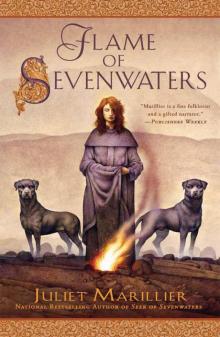 Flame of Sevenwaters
Flame of Sevenwaters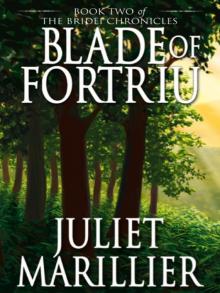 Blade of Fortriu
Blade of Fortriu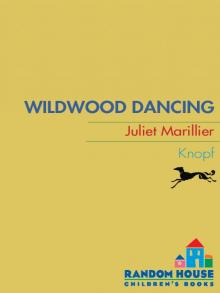 Wildwood Dancing
Wildwood Dancing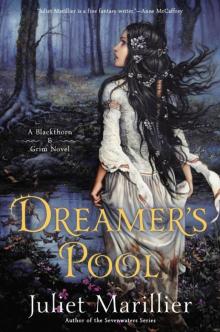 Dreamer's Pool
Dreamer's Pool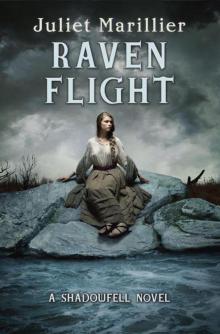 Raven Flight
Raven Flight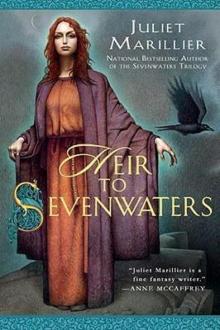 Heir to Sevenwaters
Heir to Sevenwaters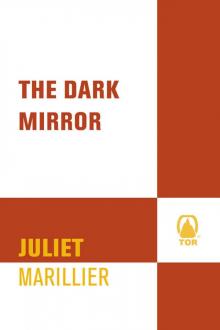 The Dark Mirror
The Dark Mirror Daughter of the Forest
Daughter of the Forest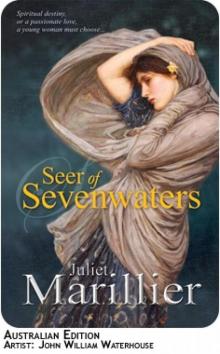 Seer of Sevenwaters
Seer of Sevenwaters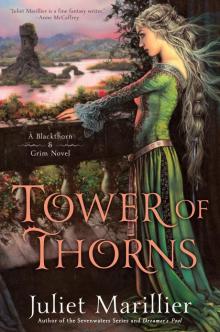 Tower of Thorns
Tower of Thorns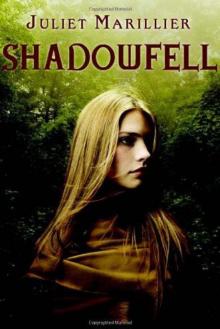 Shadowfell
Shadowfell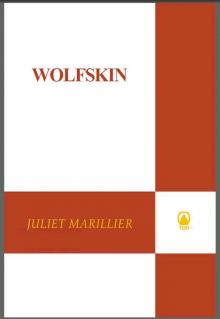 Wolfskin
Wolfskin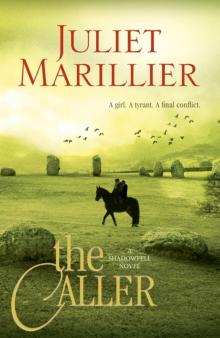 The Caller
The Caller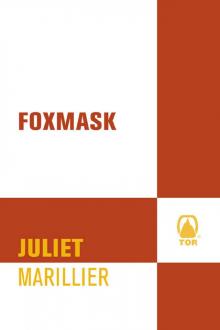 Foxmask
Foxmask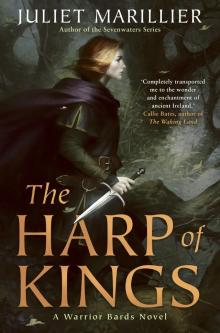 Harp of Kings
Harp of Kings The Well of Shades
The Well of Shades Heart's Blood
Heart's Blood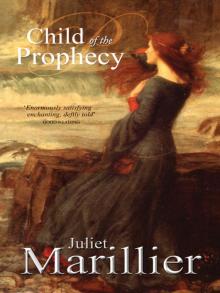 Child of the Prophecy
Child of the Prophecy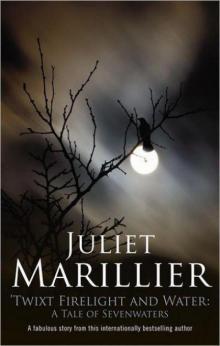 Twixt Firelight and Water
Twixt Firelight and Water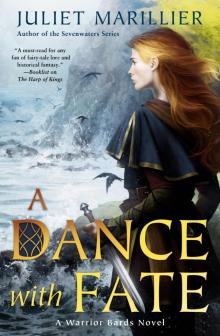 A Dance with Fate
A Dance with Fate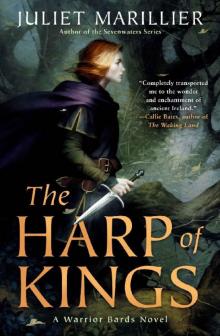 The Harp of Kings (Warrior Bards)
The Harp of Kings (Warrior Bards)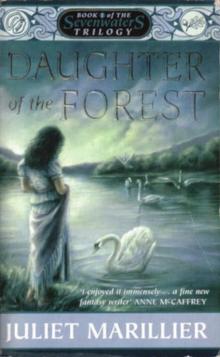 Daughter of the Forest (The Sevenwaters Trilogy)
Daughter of the Forest (The Sevenwaters Trilogy)![Sevenwaters [06] Flame of Sevenwaters Read online](http://i1.bookreadfree.com/i2/04/08/sevenwaters_06_flame_of_sevenwaters_preview.jpg) Sevenwaters [06] Flame of Sevenwaters
Sevenwaters [06] Flame of Sevenwaters![[Sevenwaters 04] Heir to Sevenwaters Read online](http://i1.bookreadfree.com/i2/04/12/sevenwaters_04_heir_to_sevenwaters_preview.jpg) [Sevenwaters 04] Heir to Sevenwaters
[Sevenwaters 04] Heir to Sevenwaters